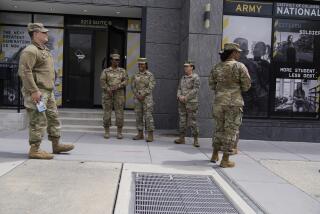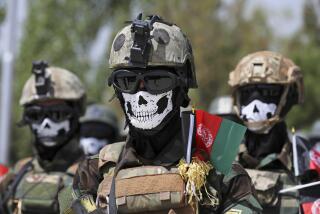Soviets Plan Cutbacks in Afghanistan : 6 Regiments to Be Out by Year’s End, Gorbachev Says
- Share via
MOSCOW — Soviet leader Mikhail S. Gorbachev announced Monday that six regiments of Soviet troops will be pulled out of Afghanistan by the end of this year.
Western military experts said the promised withdrawal of 6,000 to 10,000 of the estimated 115,000 Soviet troops in Afghanistan would not have any military importance. Soviet forces have been in Afghanistan since late 1979, supporting the Marxist government in Kabul against insurgents.
While no figures have been made public on Soviet losses in Afghanistan, accounts in the official press have indicated heavier involvement in combat in recent years. Western sources estimate that at least 10,000 Soviet soldiers have died in combat against Afghan rebels, called moujahedeen or “holy warriors.”
Soviets Criticized at U.N.
In addition, the Soviet Union has been harshly criticized in the United Nations, especially by Muslim countries, for its conduct of the war.
Speaking in the Far Eastern port of Vladivostok, Gorbachev said the pullback of the six regiments with their weapons and equipment is designed to spur a political settlement of the seven-year-old civil war.
He called indirectly on the United States and other nations to respond to the Soviet move by curtailing their military assistance to the anti-Communist guerrillas.
“All who encourage and finance the undeclared war against Afghanistan . . . should know that if the intervention continues, the Soviet Union will stand up for its neighbor,” Gorbachev added. His remarks were reported here by the official news agency Tass.
U.S. Skeptical
U.S. officials reacted with skepticism to Gorbachev’s announcement.
“There is only one acceptable solution to the Soviet occupation of Afghanistan: the prompt and complete withdrawal of the approximately 120,000 Soviet troops in that country,” White House spokesman Larry Speakes said.
Speakes and State Department spokesman Bernard Kalb called upon the Soviets to present “a short withdrawal timetable” at the next round of U.N.-sponsored proximity talks scheduled to begin Wednesday in Geneva “if they are seriously interested in a settlement.”
“Similar withdrawals announced in the past were part of regular rotation of troops without any reduction in the total number of Soviet forces in Afghanistan,” Kalb said.
Gorbachev, touching on Soviet-American relations, confirmed that he had received an answer from President Reagan to his new arms-control proposals.
“The reply sets one thinking,” Gorbachev said. “We have begun to study it. We shall treat it with responsibility and attention.
“To us, the most important thing is the extent to which the proposals contained in the (Reagan) letter meet the principle of equal security and whether they make it possible to reach effective joint solutions in ending the arms race and preventing its spread to outer space,” Gorbachev added. “We shall determine our further steps accordingly.”
U.S. officials have said that Reagan’s letter calls for delaying deployment of a space-based missile defense system for five to seven years, but with the understanding that both superpowers would eventually deploy such systems and that research and testing would continue.
Conditions for Summit
Gorbachev reiterated that the Kremlin favors a second Soviet-American summit meeting but only if it would advance normalization of relations and speed up talks on arms reduction.
After his first session with Reagan in Geneva, he added, the Soviet Union presented a series of proposals on arms reduction, but “we did not see any movement (by the United States) to meet us halfway.”
On other topics, Gorbachev renewed a proposal for an international conference on security and cooperation in Asia and the Pacific, a counterpart to the Helsinki conference for Europe.
In discussing Afghanistan, Gorbachev said the Soviet government would withdraw two motorized rifle regiments, an armored regiment and three anti-aircraft regiments before the end of 1986.
Western diplomats said Soviet motorized rifle regiments usually have about 2,000 soldiers, while armored regiments have about 1,000 and anti-aircraft regiments about 300. That would mean a total of nearly 6,000 troops in the six units mentioned by the Soviet leader.
Gorbachev said the troops will return to their home bases in the Soviet Union in such a way that “all those who take an interest . . . could easily ascertain this.” While Gorbachev did not elaborate, he apparently referred to satellite photography conducted by the United States and others.
Afghan Talks Resuming
He called the withdrawal a “serious step” to encourage agreement on ending the hostilities at the talks in Geneva that are resuming Wednesday. The talks, which began in 1982, have made little headway toward a settlement of the fighting in Afghanistan.
Soviet troops poured into Afghanistan in the waning days of 1979 and paved the way for a takeover by Moscow-backed Babrak Karmal after the death of another Communist leader, Hafizullah Amin.
Last May, however, Karmal was removed as first secretary of the People’s Democratic Party of Afghanistan and replaced by the former head of the secret police, Najibullah, who has since shortened his one-word name to Najib.
Western experts were skeptical about the significance of the Soviet withdrawal. Gorbachev’s offer “reduces the strength of Soviet forces without affecting combat capability,” said Robert Elliot of the London-based International Institute for Strategic Studies.
Military analysts noted that three of the regiments to be withdrawn are anti-aircraft units that are of little use because the guerrillas have no aircraft and there is little prospect that the air force of neighboring Pakistan will become involved in the conflict.
The one armored regiment involved also is of limited value in the rugged Afghan terrain.
The key elements in the Soviet war effort are the helicopter gunships that strike the guerrillas in their mountain strongholds and the special anti-guerrilla forces that were deployed in Afghanistan early this year.
In his speech, Gorbachev said the Soviet Union supports the creation of an Afghan government that would allow participation by “political forces that found themselves beyond the country’s borders.”
This apparently referred to an estimated 3 million to 4 million Afghan refugees who fled to Pakistan or Iran after the Soviet invasion.
Issue of Refugee Return
The return of the Afghan refugees to their homeland is one of the issues involved in the Geneva talks, along with the key dispute over the withdrawal of all Soviet forces in the country.
“As soon as a political settlement is finally worked out, the return of all Soviet troops from Afghanistan can be speeded up,” Gorbachev said.
“Schedules for their stage-by-stage return have been agreed upon with the Afghan leadership,” he added.
On other issues, the Soviet leader expressed hope for better relations with China and proposed Soviet training of Chinese cosmonauts as one cooperative program.
He also said the Soviet Union is considering a reduction of its armed forces in Mongolia, mostly along that country’s border with China. Western experts said there are 75,000 Soviet troops in Mongolia, adding additional tension to Sino-Soviet relations.
More to Read
Sign up for Essential California
The most important California stories and recommendations in your inbox every morning.
You may occasionally receive promotional content from the Los Angeles Times.












